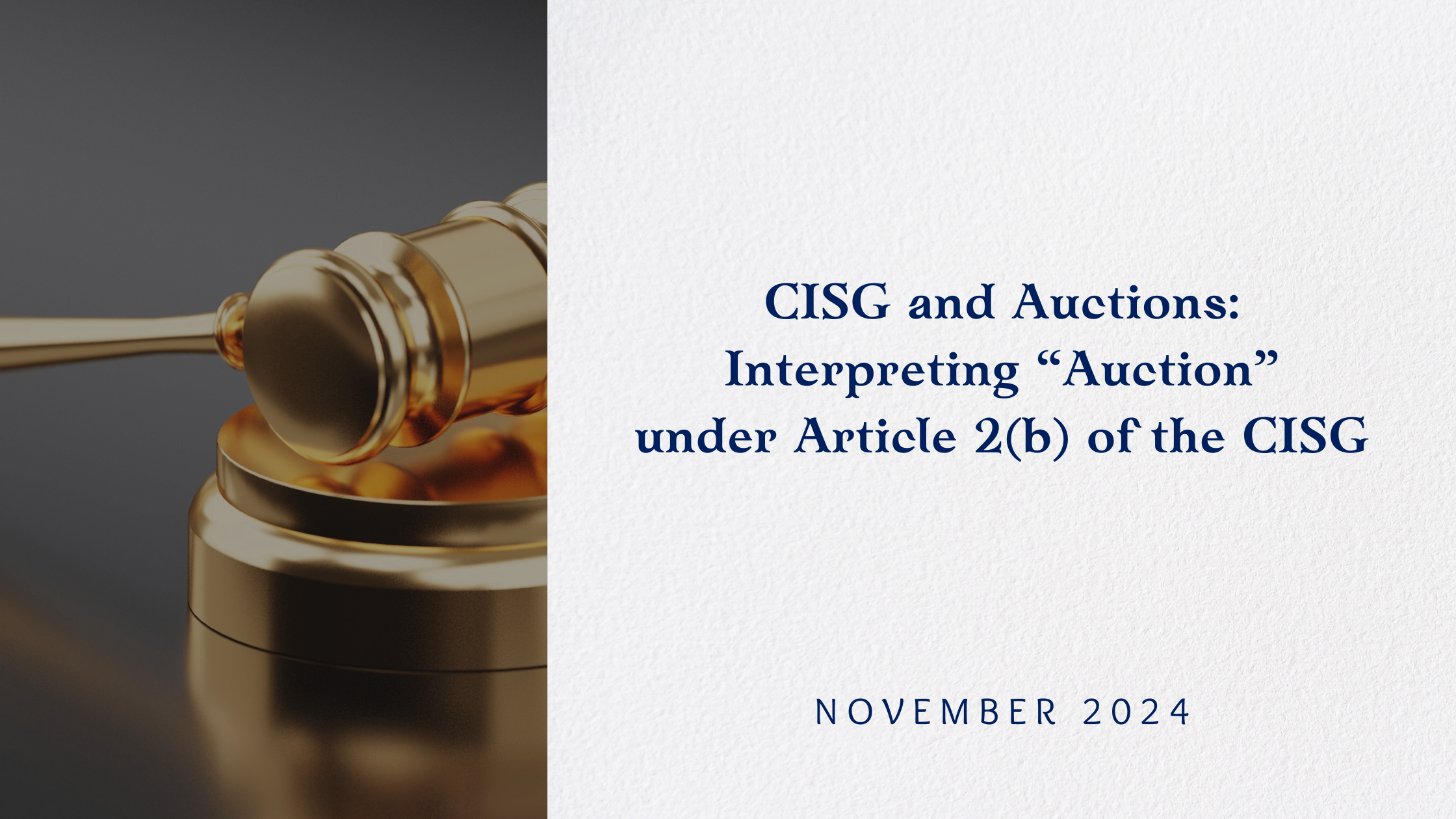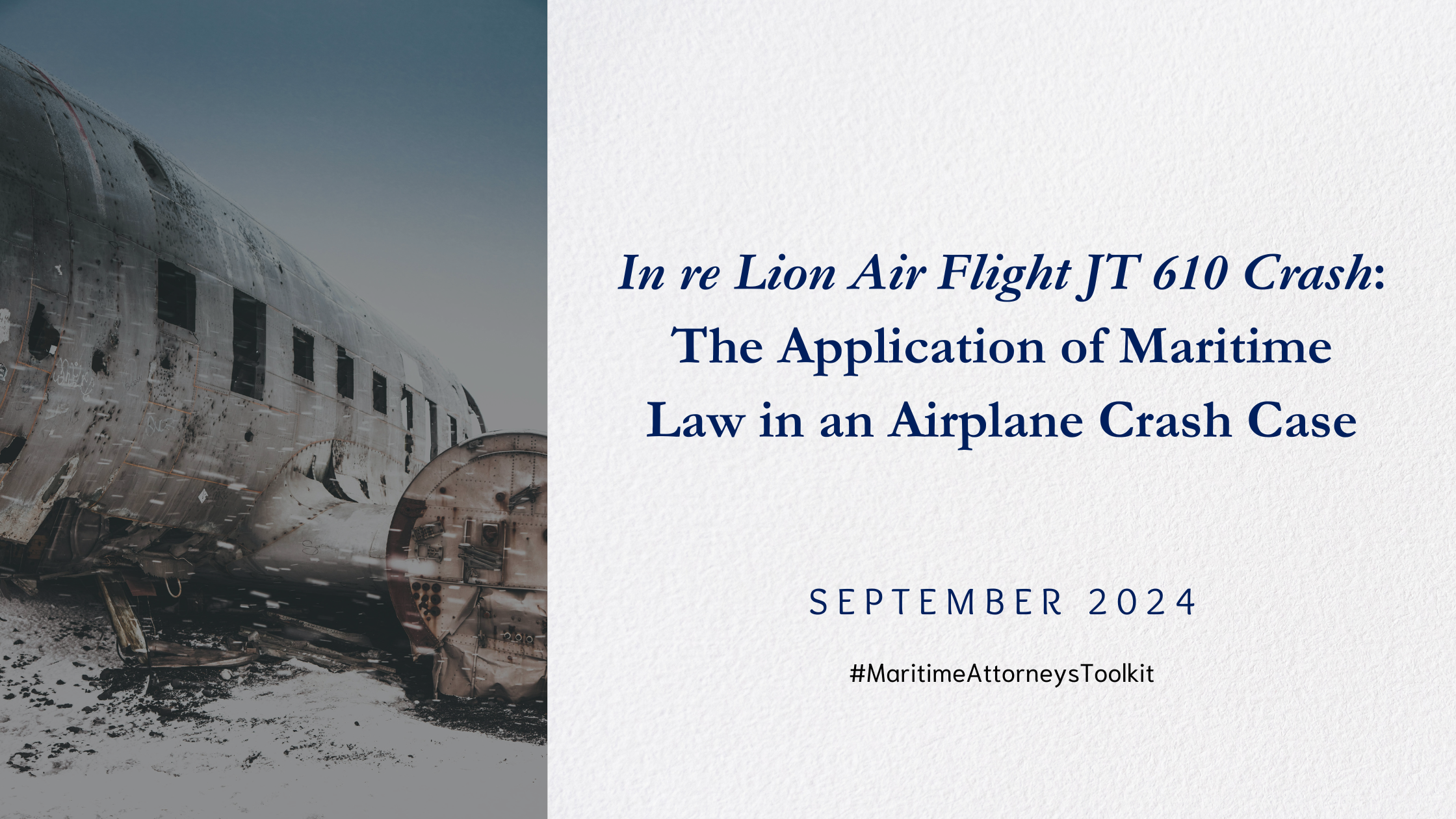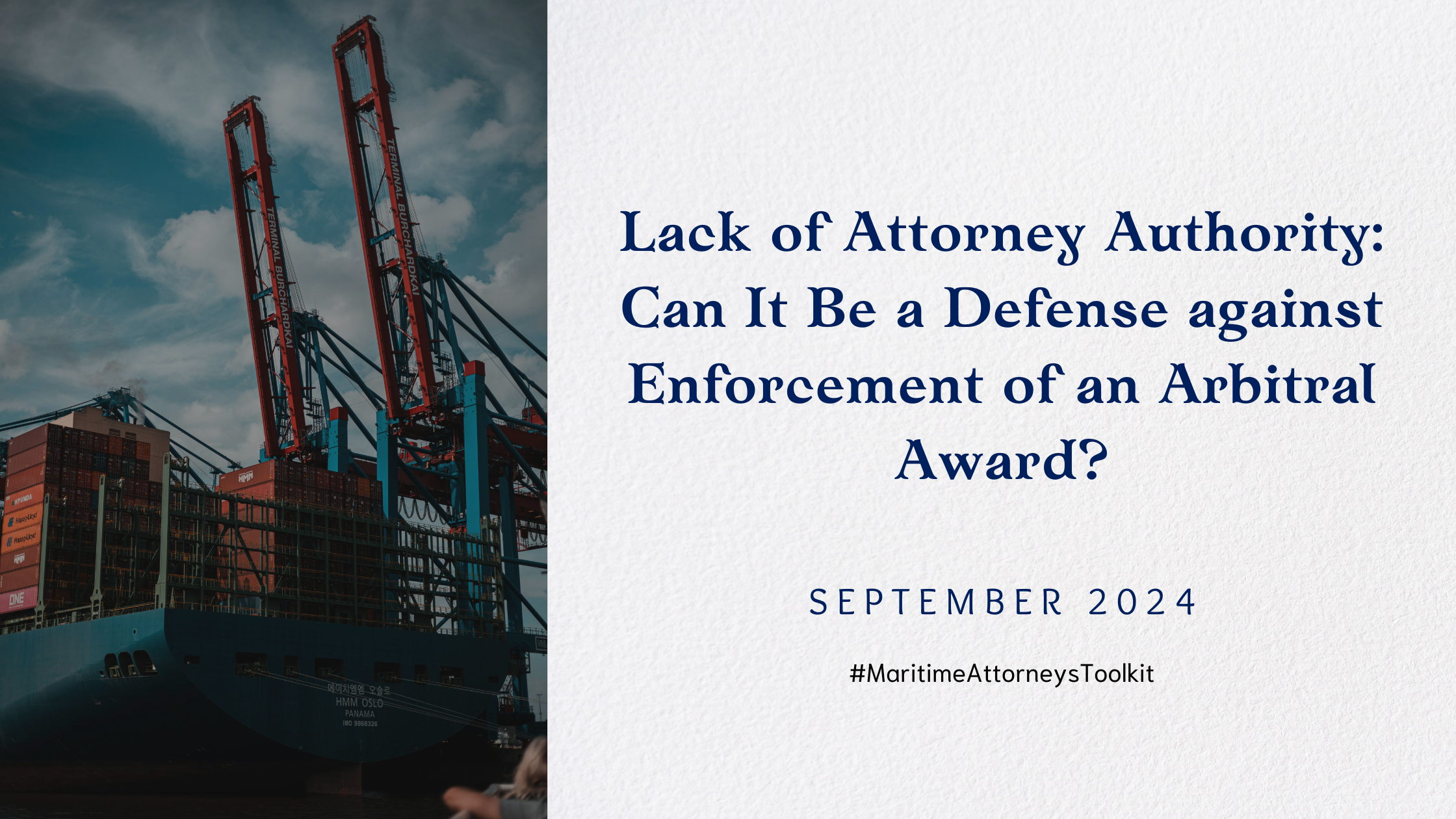Welcome to the July 2024 edition of Maritime Law Digest, a monthly review of the most significant maritime cases decided primarily by the U.S. Supreme Court, U.S. Courts of Appeals, and state supreme courts.
Here are the scenarios and issues that the courts analyzed in July 2024:
DETENTION FEES: An ocean carrier imposed detention fees on a trucking company for the late return of a container and chassis. These fees included charges for days when the relevant port was closed due to COVID-19 and therefore could not have accepted a returned container and chassis. The Federal Maritime Commission determined that these charges were “unjust and unreasonable.” Did it act arbitrarily and capriciously under the circumstances? The District of Columbia Circuit responded affirmatively. Evergreen Shipping Agency (Am.) Corp. v. Fed. Mar. Comm’n, 106 F.4th 1113 (D.C. Cir. 2024).
ADMIRALTY JURISDICTION: An electric cable, submerged and buried under the waters of a cove, was damaged when an excavator’s barge struck it. Can admiralty jurisdiction extend to a tort claim of the public utility company that owned and maintained this cable? The Fourth Circuit responded affirmatively. Baltimore Gas & Elec. Co. v. Coastline Com. Contracting, Inc., 107 F.4th 264 (4th Cir. 2024).
WRECK REMOVAL CLAUSE: Marine protection and indemnity (P&I) insurance policies often include “wreck removal clauses” that obligate the insurer to cover wreck removal expenses when the removal of a covered vessel is “compulsory by law.” When is a wreck removal “compulsory by law”? Can state law be used to determine whether a wreck removal is compulsory or not? The Fifth Circuit concluded that it does. Wapiti Energy, L.L.C. v. Clear Spring Prop. & Cas. Co., 106 F.4th 420 (5th Cir. 2024).
FORUM-SELECTION CLAUSE: The forum-selection clause in the seaman’s employment contract, which mandated that disputes be resolved in England, contradicted Louisiana’s public policy. Did the forum-selection clause remain valid and enforceable despite this contradiction? The Fifth Circuit responded affirmatively. Matthews v. Tidewater, Inc., 108 F.4th 361 (5th Cir. 2024).
Below is a detailed analysis of these cases.
I. Evergreen Shipping Agency (America) Corp. v. Federal Maritime Commission, 106 F.4th 1113 (D.C. Cir. 2024).
Evergreen involved a dispute between an ocean carrier Evergreen Shipping Agency (America) Corp. and its affiliates (hereinafter “Evergreen”), on the one side, and the Federal Maritime Commission (hereinafter the “FMC”), on the other side. The dispute focused on whether the detention charges that Evergreen collected from TCW Inc., a trucking company, were “unjust and unreasonable” insofar as the charges were for days when the relevant port was closed due to COVID-19 and therefore could not have accepted a returned container and chassis from TCW.
1. Factual Background.
Yamaha Motor Company, Ltd., the shipper, entered into a contract with Evergreen for the transportation of motorcycles from the Port of Shimizu, Japan, to Yamaha’s facility in Newnan, Georgia. Evergreen handled the ocean portion of the journey. As for the land portion, Yamaha designated TCW as its “preferred carrier” and therefore authorized TCW to transport the shipment from the Port of Savannah to Yamaha’s facility in Newnan, Georgia.
Pursuant to the governing contract, Yamaha, and, therefore, TCW, were entitled to receive 21 days of free time1In a maritime contract, “free time” refers to the period during which a shipper or consignee is allowed to use a shipping container without incurring additional charges. for use of the container and 4 days of free time for use of the chassis. After these periods expired, detention charges of $150 per day for the container and $20 per day for the chassis would apply, including weekends and holidays.
On April 28, 2020, the cargo arrived at the Port of Savannah and was picked up by TCW. Pursuant to the governing contract, the free time expired on May 4, 2020, for the chassis2Because the 4 days of free time for the chassis would have expired on a weekend, per the governing contract, free time for the chassis did not expire until the following Monday, May 4, 2020. and on May 19, 2020, for the container. TCW returned both on May 26, 2020, resulting in a 7-day delay for the container and a 22-day delay for the chassis.
Evergreen invoiced TCW for $1,490 in detention charges. TCW contested $510 of this amount, arguing that they should not be held responsible for the charges incurred between May 23–25, 2020, when the Port of Savannah was closed, preventing them from returning the equipment. Evergreen, however, declined to waive these charges.
TCW paid the invoice in full and then filed a claim against Evergreen with the FMC, requesting an order that would direct Evergreen to reimburse $510 in detention charges.
The FMC ordered Evergreen to pay reparations ($510 with interest) to TCW, finding that it was “unjust and unreasonable” under 46 U.S.C. § 41102(c) for Evergreen to have charged TCW per diem when the Port of Savannah was closed.
Evergreen petitioned the District of Columbia Circuit for review.
2. Detention Charges: What They Are and When They Become “Unjust and Unreasonable.”
Detention charges are fees incurred when equipment, such as shipping containers or chassis, is held beyond the agreed-upon free time period specified in a shipping or transportation contract. These charges are typically applied on a per-day basis and can vary depending on the type of equipment and the terms of the contract.
Detention charges are used “to ensure that shippers expeditiously pick up their cargo and promptly return empty containers so the equipment can be used by the next customer.”3Impacts of Shipping Container Shortages, Delays, and Increased Demand on the North American Supply Chain: Hearing Before the Subcomm. on Coast Guard & Maritime Transport of the H. Comm. on Transp. & Infrastructure, 117 Cong. 39 (2021) (written statement of John W. Butler, President & CEO, World Shipping Council). “This keeps the supply chain moving and enhances service efficiency, reliability, and predictability,” said John W. Butler, a former President and CEO of the World Shipping Council.4Id. at 9.
Mr. Butler explained that if “thousands and thousands of containers are stuck aboard ships at anchor, on port terminals waiting to be picked up, on railcars and trucks, waiting to be unloaded, and at inland warehouses and distribution centers that cannot process cargo fast enough to empty containers and put them back in circulation,” these containers are “idled and cannot be used to move additional cargo.”5Id. at 3. This situation not only leads to container shortages and port congestion but also disrupts the operations of ocean carriers and all other participants in the supply chain, making it difficult for them to deliver goods to their customers on time.
While common carriers, marine terminal operators, and ocean transportation intermediaries may establish their own practices related to detention charges, they “do not have an unbounded right to contract for whatever they want.”6Interpretative Rule on Demurrage and Detention Under the Shipping Act, 85 Fed. Reg. 29638 (May 18, 2020). Their practices must comply with the provisions of the Shipping Act of 1984, one of which is section 41102(c), mandating that they “establish, observe, and enforce just and reasonable regulations and practices relating to or connected with receiving, handling, storing, or delivering property.”
The Shipping Act grants the FMC the authority to determine whether a detention charge is “just and reasonable.” See 46 U.S.C. § 41102(c); see also 46 C.F.R. § 545.4(d).
On May 18, 2020, the FMC published its “Interpretive Rule on Demurrage and Detention Under the Shipping Act,” providing guidance on how the FMC would assess whether detention and demurrage charges are “just and reasonable” in various factual scenarios. This interpretive rule was codified at 46 C.F.R. § 545.5.
Pursuant to 46 C.F.R. § 545.5(c)(1), “[i]n assessing the reasonableness of demurrage and detention practices and regulations, the Commission will consider the extent to which demurrage and detention are serving their intended primary purposes as financial incentives to promote freight fluidity.” The application of this rule, known as the “incentive principle,” would “vary depending on the facts of a given case.”785 Fed. Reg. at 29641 (citation omitted).
One scenario where the incentive principle could be applied—and which was relevant in Evergreen—is the return of empty containers. The FMC explained that, [a]bsent extenuating circumstances, practices and regulations that provide for imposition of detention when it does not serve its incentivizing purposes, such as when empty containers cannot be returned, are likely to be found unreasonable.” 46 C.F.R. § 545.5(c)(2)(ii).
TCW invoked this provision, arguing that the detention charges incurred between May 23–25, 2020, were unjust and unreasonable because it could not have returned an empty container and chassis when the port was closed and therefore the charge could not have been a “motivating factor for increasing cargo fluidity.”
The FMC agreed.
3. The District of Columbia Circuit’s Opinion.
The District of Columbia Circuit found that the FMC’s order was arbitrary and capricious.
First, the FMC failed to consider “several critical facts and extenuating circumstances” in determining whether the detention charges for May 23–25 were just and reasonable, including: (1) Evergreen’s allotment of 21 days of free time for the container and 4 days of free time for the chassis, which TCW did not claim was unreasonable; (2) TCW’s contractual obligation to pay detention charges after the expiration of free time; (3) the Port of Savannah had announced, before TCW took the container, the days on which it would be closed; and (4) free time on both the chassis and container had expired before the May 23–25 closures. The FMC did not explain why these circumstances either were not relevant to whether the detention charges were just and reasonable or were outweighed by countervailing considerations.
Second, the FMC provided an illogical explanation to justify its argument that a detention charge necessarily lacks any incentivizing effect because it is levied for a day on which a container cannot be returned to a marine terminal. The FMC explained that there could be “potential logjams if there is a rush to get equipment in before a weekend closure.” The District of Columbia Circuit deemed this explanation illogical: “If the [FMC] is right that there is no incentivizing effect from charging detention fees on a weekend when a port is closed, then why would there be a logjam to avoid the detention charge? This logical inconsistency alone renders the [FMC’s] Order arbitrary and capricious.”
Based on the foregoing, the District of Columbia Circuit vacated the FMC’s order and remanded this matter to the FMC for further proceedings.
II. Baltimore Gas and Electric Company v. Coastline Commercial Contracting, Inc., 107 F.4th 264 (4th Cir. 2024).
In Baltimore Gas & Electric, the Fourth Circuit examined whether a court of the United States has admiralty jurisdiction over a tort claim related to an incident where an excavator’s barge struck a power cable that was submerged and buried under the waters of a cove. The Fourth Circuit responded affirmatively.
1. Factual Background.
In 2019, a 13,000-volt electric cable located at the bottom of Eli Cove in Pasadena, Maryland, was damaged. Baltimore Gas & Electric Co., a public utility company that owned and maintained this cable, claimed that the damage occurred when a barge owned by Coastline Commercial Contracting struck it. The incident allegedly happened while Coastline was performing the work for a couple who owned property on Eli Cove and who hired Coastline to extend their existing pier further into the cove.
For the project, Coastline needed to send a barge from its Stoney Creek headquarters to excavate the cove’s floor and install new pilings for the pier extension. While moving the barge to the site, it allegedly struck the cable, which resulted in a power outage and $1.3 million in repair costs.
Baltimore Gas & Electric sued Coastline and the property owners in federal district court, alleging that Coastline failed to exercise reasonable care in performing the work and that the property owners were negligent in failing to inform Coastline about the location and existence of the cable.
Baltimore Gas & Electric invoked federal admiralty jurisdiction over the claim against Coastline and supplemental jurisdiction over the claim against the property owners. Coastline and the property owners filed motions to dismiss, arguing a lack of admiralty jurisdiction. The district court granted their motions. Baltimore Gas & Electric appealed.
2. The Fourth Circuit’s Opinion.
The Fourth Circuit found that the district court has admiralty jurisdiction over this suit.
A party seeking to invoke federal admiralty jurisdiction over a tort claim must satisfy conditions both of location and of connection with traditional maritime activity. Exec. Jet Aviation, Inc. v. City of Cleveland, Ohio, 409 U.S. 249 (1972). The alleged wrong must occur or be located over a navigable waterway (the locus prong), and the wrong must bear a significant relationship to traditional maritime activity (the nexus prong). Id.; see also Jerome B. Grubart, Inc. v. Great Lakes Dredge & Dock Co., 513 U.S. 527 (1995); Mullenix v. United States, 984 F.2d 101 (4th Cir. 1993).
As for the locus prong, the Fourth Circuit found it to be satisfied. “A court applying the location test must determine whether the tort occurred on navigable water or whether injury suffered on land was caused by a vessel on navigable water.” Grubart, 513 U.S. at 534 (citation omitted). “The waters are navigable if they are currently being used as a highway of commerce or if they are susceptible of being so used. Waters are susceptible of such use when they are, in their current configuration, capable of commercial navigation.” Price v. Price, 929 F.2d 131 (4th Cir. 1991). Here, the Court found that Eli Cove is “navigable” for purposes of admiralty jurisdiction. Baltimore Gas & Electric, 107 F.4th at 269 (“[N]ot only is the cove lined with commercially built piers, but Coastline itself was engaged in commercial activity when it allegedly struck the underwater cable.”).
As for the nexus prong, the Fourth Circuit likewise found it to be satisfied. The connection test has two requirements: (1) the incident must have a potentially disruptive impact on maritime commerce, and (2) the activity giving rise to the incident must bear a substantial relationship to traditional maritime activity. Grubart, 513 U.S. at 534. Here, the Court found both conditions met.
First, the incident posed a sufficient risk of disruption to maritime commerce, though fortunately none occurred. Baltimore Gas & Electric, 107 F.4th at 271 (“Electricity and water are a dangerous combination. The striking of an underwater electric cable could plausibly lead to an electrical fire, an explosion, or electrocution of those on board a vessel or in the waters around. And in response to such exigencies on navigable waters, the Coast Guard and other commercial rescue vehicles would be called upon to render aid.”).
Second, Coastline’s activity not only bore a substantial relationship to traditional maritime activity but was “the epitome of it.” Id. This is because the activity giving rise to the incident was “repair or maintenance work on a navigable waterway performed from a vessel.” Id. The Supreme Court has held that the navigation of vessels in navigable waters is substantially related to maritime activity. See Grubart, 513 U.S. at 540 (finding there was “no question that the activity” of “repair or maintenance work on a navigable waterway performed from a vessel” was “substantially related to traditional maritime activity”).
Based on the foregoing, the Fourth Circuit held that admiralty jurisdiction was established. It thus reversed the district court’s judgment and remanded the case for further proceedings.
III. Wapiti Energy, L.L.C. v. Clear Spring Property and Casualty Company, 106 F.4th 420 (5th Cir. 2024).
Wapiti involved a dispute between a barge owner and its insurer regarding the interpretation of a wreck removal clause in a marine protection and indemnity (P&I) insurance policy. This clause required the insurer to cover wreck removal expenses when the removal of a covered vessel is “compulsory by law.” When is a wreck removal “compulsory by law”? Can state law be used to determine whether a wreck removal is compulsory or not? The Fifth Circuit concluded that it does.
1. Factual Background.
During Hurricane Ida, a tank barge owned by Wapiti Energy, L.L.C. (“Wapiti”) broke loose from its permanent moorings and ran aground in marshland owned by ConocoPhillips. Wapiti hired a contractor to offload the oil stored on the barge and refloat it. This project cost Wapiti $926,840.32.
The vessel was insured under a marine package policy issued by Clear Spring Property and Casualty Company (“Clear Spring”). It provided coverage for wreck removal expenses that are “compulsory by law.” Clear Spring moved for summary judgment, arguing that the removal of Wapiti’s vessel was not “compulsory by law,” and therefore, it was not obligated to reimburse the expenses Wapiti incurred in removing the stranded vessel from the marshland.
The district court ruled in favor of Clear Spring, concluding that removal of Wapiti’s vessel was not “compulsory by law” and dismissing Wapiti’s claims.
Wapiti appealed.
2. The Fifth Circuit’s Opinion.
The Fifth Circuit found that the Louisiana possessory action made the removal of Wapiti’s vessel “compulsory by law.”
The Fifth Circuit held that “removal of a wreck is compulsory in the following, admittedly overlapping, instances: (1) criminal sanctions would be imposed for failure to remove; (2) a government order mandates removal; or (3) a cost-benefit analysis conducted by a fully informed, reasonable owner at the time of the incident demonstrates that the amount and likelihood of liability imposed by a failure to remove mandates removal of the wreck.” Wapiti, 106 F.4th at 424 (quoting Progress Marine, Inc. v. Foremost Ins. Co., Grand Rapids, Mich., 642 F.2d 816, 820–21 (5th Cir. 1981); Cont’l Oil Co. v. Bonanza Corp., 706 F.2d 1365, 1372–73 (5th Cir. 1983)).
The Fifth Circuit also held that “state law can be the source of potential liability sufficient to compel the removal of a wreck.” Id. “This is because, ‘[a]bsent a specific and controlling federal rule, cases involving marine insurance contracts are governed by state law.’” Id. (citations omitted).
Notably, the Court chose not to apply the preemption doctrine established in Jensen. See S. Pac. Co. v. Jensen, 244 U.S. 205 (1917). Under this doctrine, state law may affect maritime affairs “to some extent,” but is invalid if it: (1) “contravenes the essential purpose expressed by an act of Congress,” or (2) “works material prejudice to the characteristic features of the general maritime law,” or (3) “interferes with the proper harmony and uniformity” of maritime law in its interstate and international relations. Id. at 216. Jensen’s preemption doctrine has faced criticism and has not been applied consistently by the courts.8Justice Stevens believed that the proper focus of the preemption inquiry should be “on whether the state provision in question conflicts with some particular substantive rule of federal statutory or common law, or, perhaps, whether federal maritime rules, while not directly inconsistent, so pervade the subject as to preclude application of state law.” Am. Dredging Co. v. Miller, 510 U.S. 443, 461 (1994) (Stevens, J., concurring). Ultimately, Justice Stevens concluded that the Supreme Court “should jettison Jensen’s special maritime pre-emption doctrine and its abstract standards of ‘proper harmony’ and ‘characteristic features.’” Id. Here, the Fifth Circuit’s rationale for applying state law was based solely on the absence of a “specific and controlling federal rule.” The Supreme Court has yet to reconcile the existing discrepancies in preemption analyses applied by the courts in maritime cases.
After establishing that state law was applicable, the Fifth Circuit turned to whether the Louisiana possessory action made removal of Wapiti’s vessel “compulsory by law.” The Court responded affirmatively. This is because, under Louisiana law, ConocoPhillips—the owner of the marshland where Wapiti’s vessel ran aground—would be entitled to injunctive relief that would entail removal of the stranded vessel from ConocoPhillips’s marshland. La. Code Civ. Proc. Ann. art. 3663. “[A]t the time of the incident, [Wapiti] knew that her barge was stranded on a third party’s property and that [it] therefore faced a high probability of having to comply with an injunction mandating the removal of [its vessel] from ConocoPhillips’s property—a court order not materially different from the types of government mandates we found to be sufficient—but not necessary—to satisfy the ‘compulsory by law’ standard in Progress Marine and Continental Oil.” Wapiti, 106 F.4th at 425–26 (quoting Progress Marine, 642 F.2d at 821; Cont’l Oil Co., 706 F.2d at 1377).
The Fifth Circuit concluded the district court erred in granting summary judgment in favor of Clear Spring because the Louisiana possessory action made the removal of Wapiti’s vessel “compulsory by law.” Accordingly, the Court reversed the district court’s judgment and remanded the case for further proceedings.
IV. Matthews v. Tidewater, Inc., 108 F.4th 361 (5th Cir. 2024).
This suit stems from injuries that the plaintiff Marek Matthews allegedly sustained during the course of his employment with Tidewater Crewing, Ltd., and Tidewater, Inc. (collectively, “Tidewater”). Tidewater Crewing, Ltd., is incorporated and maintains its principal place of business in the Cayman Islands. Tidewater, Inc., is incorporated in Delaware and maintains its principal place of business in Texas.
Matthews asserted that from 1982 to 2016, while working on Tidewater’s assignments in the Red Sea, he was exposed to hazardous chemicals on Tidewater’s supply vessels. He further claimed that Tidewater did not provide him with any means of protection against this exposure, leading to his development of end-stage renal disease, kidney failure, and prostate cancer.
Matthews’s employment contract contained a forum-selection clause requiring that any dispute arising out of Matthews’s employment with Tidewater be litigated in the High Court of Justice in London, England. The United States District Court for the Eastern District of Louisiana determined that the forum-selection clause was valid and enforceable. It dismissed the case on forum non conveniens grounds.
Matthews appealed, arguing that the forum-selection clause was invalid and unenforceable for two reasons: (1) his health condition made traveling to England inconvenient, and (2) the forum-selection clause conflicted with Louisiana’s public policy.
The Fifth Circuit dismissed Matthews’s first argument. The appropriate standard for determining whether the forum-selection clause is “unreasonable under the circumstances” and thus unenforceable is not whether traveling is inconvenient, but whether the selected forum poses a “grave inconvenience or unfairness.” Haynsworth v. The Corp., 121 F.3d 956, 963 (5th Cir. 1997) (quotation marks and citations omitted). Matthews did not dispute the fairness of England as a forum. The Fifth Circuit itself has repeatedly recognized England as a “fair and impartial” forum. Haynsworth, 121 F.3d at 967.
The Fifth Circuit also dismissed Matthews’s second argument. The Supreme Court held that “[a] contractual choice-of-forum clause should be held unenforceable if enforcement would contravene a strong public policy of the forum in which suit is brought, whether declared by statute or by judicial decision.” M/S Bremen v. Zapata Off-Shore Co., 407 U.S. 1, 15, 92 S. Ct. 1907, 1916 (1972) (emphasis added). Following its precedent in Lim v. Offshore Specialty Fabricators, Inc., 404 F.3d 898 (5th Cir. 2005), the Fifth Circuit examined both Louisiana and federal public policy. The Court found that while the forum-selection clause contravened the strong public policy of Louisiana,9Under Louisiana law, “[t]he provisions of every employment contract or agreement … which … includes a choice of forum clause or choice of law clause in an employee’s contract of employment … shall be null and void except where the choice of forum clause or choice of law clause is expressly, knowingly, and voluntarily agreed to and ratified by the employee after the occurrence of the incident which is the subject of the civil or administrative action.” La. R.S. § 23:921A(2). The Supreme Court of Louisiana held that “Louisiana Revised Statute 23:921A(2) is a strong expression of Louisiana public policy concerning forum selection clauses” that are not ratified after a plaintiff sustains injuries giving rise to the suit. Sawicki v. K/S Stavanger Prince, 2001-0528 (La. 12/7/01), 802 So. 2d 598, 606. it did not conflict with federal public policy, according to which “forum selection clauses in admiralty cases are presumptively valid and enforceable.”10“In M/S Bremen v. Zapata Off-Shore, the Supreme Court held that forum selection clauses in admiralty cases are presumptively valid and enforceable.” Marinechance Shipping, Ltd. v. Sebastian, 143 F.3d 216, 220 (5th Cir. 1998). Since Louisiana’s public policy conflicted with federal public policy and the state’s connection to the case was minimal, the Court decided not to apply Louisiana’s public policy.11“We recognize the forum-selection clause contravenes the strong public policy of Louisiana. We are, however, wary of creating any inconsistency or unpredictability that federal public policy so adamantly strains to prevent. Louisiana public policy conflicts with and frustrates the federal public policy’s presumption of validity and arguably perpetuates the uncertainties Bremen warns against. Even if Louisiana’s public policy is relevant under a Bremen analysis, its particular application in this case does not overcome the federal public policy’s presumption of a maritime forum-selection clause’s validity.” Matthews, 108 F.4th at 370. It ruled that the forum-selection clause that required litigation in England was valid and enforceable.
The information provided in this article is intended for informational purposes only and does not constitute legal advice. It should not be relied upon or applied without consulting an attorney to address your specific circumstances. Please note that this article was published on the date indicated and may not reflect subsequent changes in the law.





